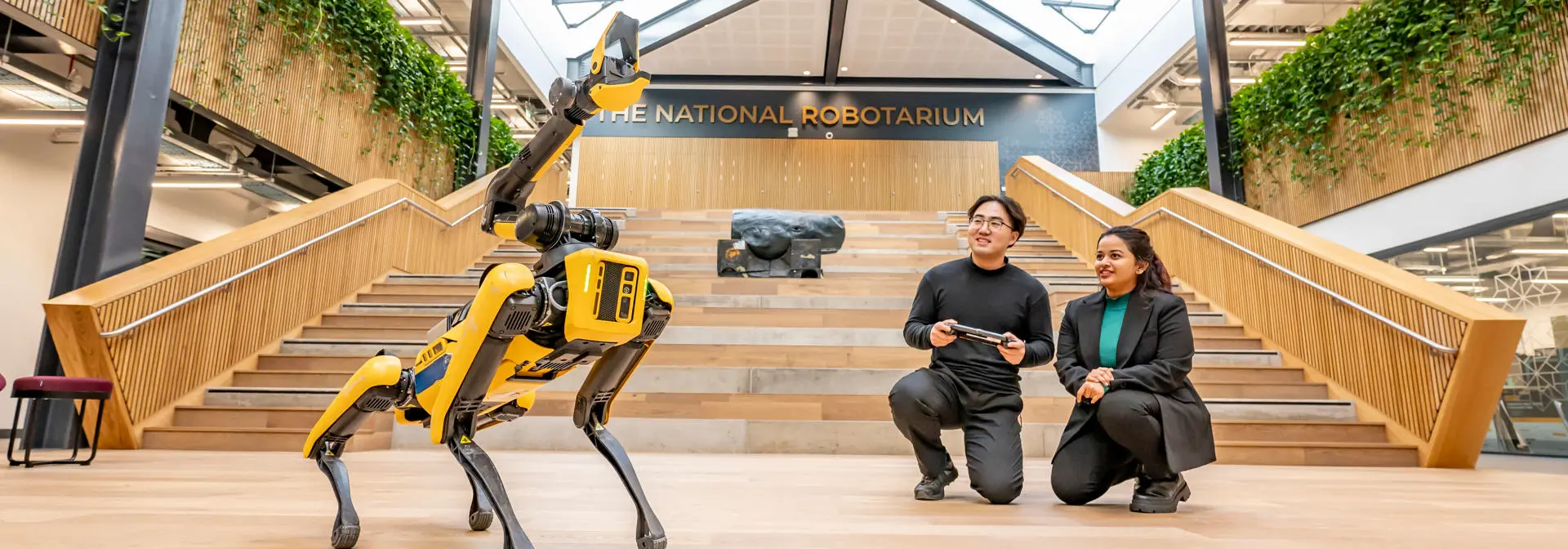Key information
- Level
- Postgraduate Taught
- Delivery type
- Full Time
- Degree qualification
- MSc
- Mode of delivery
- On-Campus
- Duration
- 1 year
- Location
- Edinburgh
- Start date
- September, January
- Next intake
- September
The MSc Robotics postgraduate master’s degree is linked to the UK’s National Robotarium and will equip you to work in industry and wider society in areas where robots can be used to improve productivity, transform transportation, work in extreme environments, and improve quality of life.
Students gain expertise in kinematics, robot control, navigation, planning, machine vision, and human-robot interaction, alongside enabling technologies such as AI, NLP, ML, and IoT.
The programme offers extensive training in robot programming with ROS, practical implementation on real robots, and major projects involving autonomous vehicles, underwater robots, humanoid and social robots, advanced manipulators, and novel designs.
With flexibility to specialise in chosen domains and mentorship from leading research groups, graduates are prepared for careers in manufacturing, medical robotics, offshore energy, environmental monitoring, defence, and more.
As robotics and AI drive global innovation and investment, demand for skilled professionals is rapidly growing, with the worldwide economic impact of robotics predicted to reach up to US$4.5 trillion by 2025.
Your student experience
Our MSc Robotics draws upon the world class research carried out by Heriot-Watt as part of the EPSRC (Engineering and Physical Sciences Research Council) Centre for Doctoral Training in Robotics and Autonomous Systems (CDT-RAS). The centre is leading in the UK effort to realise the potential of Robotics and artificial intelligence (AI) technology, by producing a new generation of highly skilled researchers, trained to take a leading role through technical skills coupled to industry and marketing awareness.
Your learning will be informed by the expertise of our research-active robotics electrical and electronic engineers, and academics.
96% of Heriot-Watt University’s engineering research was classed as world-leading in the REF 2021 review, which ranked us 1st in Scotland and 3rd in the UK for engineering research through a joint submission with the University of Edinburgh.
Heriot-Watt also hosts the National Robotarium. The multimillion-pound innovation hub for robotics and autonomous systems has been built in collaboration with the University of Edinburgh and delivers leading research and support for business creation and growth. The presence of the National Robotarium provides you with the opportunity to gain knowledge and skills at the forefront of robotics and AI.
The research relevance of this postgraduate programme ensures your studies remain innovative and industry focused.
Go Global
There are currently no Go Global opportunities for this particular programme. However, other Go Global opportunities may be available. Please contact studywithus@hw.ac.uk for more information.
Course content
September Intake - Edinburgh
Year 1
Mandatory September
- Robotics Systems Science
- Intelligent Robotics
Optional September
- Embedded Systems
- Optimisation & Deep Learning for Imaging and Vision I
- Biologically Inspired Computation
- Data Mining and Machine Learning
- Internet of Things
- Human Robot Interaction
Mandatory January
- Machine Vision
- Robotic Mechanical Systems
Optional January
- Embedded Software
- Critical Analysis and Research Preparation
- Conversational Agents and Spoken Language Processing
- Image Processing
- Systems Thinking and Analysis
- Optimisation and Deep Learning for Imaging and Vision II
- Research Methods and Project Planning
Optional May
- MSc Project
- Masters Project and Dissertation
January Intake - Edinburgh
Year 1
Mandatory January
- Robotic Mechanical Systems
- Machine Vision
Optional January
- Image Processing
- Embedded Software
- Conversational Agents and Spoken Language Processing
- Systems Thinking and Analysis
Mandatory September
- Robotics Systems Science
- Intelligent Robotics
Optional September
- Data Mining and Machine Learning
- Biologically Inspired Computation
- Human Robot Interaction
- Research Methods and Project Planning
- Optimisation & Deep Learning for Imaging and Vision I
- Embedded Systems
- Internet of Things
- Critical Analysis and Research Preparation
Optional Second January
- Masters Project and Dissertation
- MSc Project
Disclaimer
The courses mentioned above may change between now and the time that you study. For more information, please view our Terms and Conditions.
Programme Video
Study MSc Robotics at Heriot-Watt University
Join Anish as he talks about why he chose to study MSc Robotics at Heriot-Watt University, explores the learning environment and course content, and his plans for life after graduation.
The Heriot-Watt experience
Student testimonials

Sara's story
Graduate, Robotics MSc
There is not a place like the Edinburgh Centre of Robotics, joint centre of Heriot-Watt and University of Edinburgh. They have so much expertise, so many robots and facilities. I could learn a bit of everything - from AI, foundation of robotics, IoT to, most interesting for me, social robotics.See more
Fees and funding
| Status | Full Time |
|---|---|
| UK | £12,744 |
| International | £28,952 |
- Status: Your residency status is usually defined as the country where you have been ordinarily resident for the three years before the start of your course.
- International: 'International' includes applicants from European Union countries who do not hold Pre-Settled or Settled status in UK. (This does not include students from the Republic of Ireland - see above).
Scholarships and bursaries
Postgraduate scholarships and bursaries
We aim to encourage well-qualified, ambitious students to study with us and we offer a wide variety of scholarships and bursaries to achieve this. Over £6 million worth of opportunities are available in fee and stipend scholarships, and more than 400 students benefit from this support.
Entry requirements
We have standard entry requirements for all of our courses that you will have to meet.
Year 1
A first class or upper second honours degree in mathematics, physics, engineering, and computer science or other relevant disciplines with a numerate background and sufficient computer programming experience. Equivalent overseas qualifications will also be considered. We can consider a 2:2 in relevant subject areas in conjunction with 3 or more years of relevant work experience.
We welcome applications from international students and accept qualifications from around the world. Please refer to the entry requirements for your country for more details.
English language requirements
If your first language is not English, we'll need to see evidence of your English language ability.
The minimum English language requirement for entry to this programme is IELTS 6.0 (or equivalent) with no score lower than 5.5.
If you do not have IELTS 6.0, we offer a range of English language courses to help you meet the English language requirement for this programme prior to commencing your studies.
Please see our detailed English language requirements.
Why Heriot-Watt
We're the top university in Scotland for graduate outcomes which means that more of our graduates are employed or in postgraduate education than any other institution in the country and we ranked 5th in the UK.
We're also rated number one in the UK for CEO or MD roles, meaning more of our graduates go on to become CEOs or MDs than any other university in the whole of the UK. On top of that, we have beautiful campuses, across the globe, so you'll get a truly international education. Our Edinburgh Campus is home to Oriam, Scotland's National Sports Performance Centre combined with plenty of wellbeing resources, prioritising fitness and mental health for all students. Our Global Research Institutes look at solving real world issues such as climate change and saving our oceans as well as working on the next medical technological breakthrough and the future of AI and robots.
Student life
Explore facilities, and chat to staff and students







